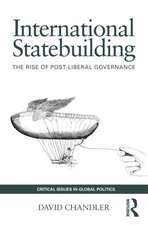The Forgotten Front: Patron-Client Relationships in Counterinsurgency
Autor Walter C. Ladwig IIIen Limba Engleză Paperback – 8 iun 2017
| Toate formatele și edițiile | Preț | Express |
|---|---|---|
| Paperback (1) | 289.28 lei 6-8 săpt. | |
| Cambridge University Press – 8 iun 2017 | 289.28 lei 6-8 săpt. | |
| Hardback (1) | 693.11 lei 6-8 săpt. | |
| Cambridge University Press – 21 iun 2017 | 693.11 lei 6-8 săpt. |
Preț: 289.28 lei
Nou
Puncte Express: 434
Preț estimativ în valută:
55.37€ • 60.17$ • 46.54£
55.37€ • 60.17$ • 46.54£
Carte tipărită la comandă
Livrare economică 21 aprilie-05 mai
Preluare comenzi: 021 569.72.76
Specificații
ISBN-13: 9781316621806
ISBN-10: 1316621804
Pagini: 360
Dimensiuni: 150 x 226 x 16 mm
Greutate: 0.64 kg
Editura: Cambridge University Press
Colecția Cambridge University Press
Locul publicării:Cambridge, United Kingdom
ISBN-10: 1316621804
Pagini: 360
Dimensiuni: 150 x 226 x 16 mm
Greutate: 0.64 kg
Editura: Cambridge University Press
Colecția Cambridge University Press
Locul publicării:Cambridge, United Kingdom
Cuprins
1. A recurring obstacle; 2. Allies in counterinsurgency; 3. Inter-alliance influence; 4. America's boy? The Philippines, 1947–53: 4.1 Crafting a strategy, 1947-50; 4.2 Implementing military and economic reform, 1950-1; 4.3 The political effort, 19513; 5. The puppet that pulled its own strings? Vietnam, 1957–63: 5.1 The Eisenhower years, 1957–60; 5.2 The origins of the Kennedy commitment, 1961; 5.3 The illusion of progress and the end of diem; 6. The lesser of two evils? El Salvador, 1979–92: 6.1 The Carter years, 1979–80; 6.2 The Reagan initiative, 1981–4; 6.3 Return to stalemate, 1985–92; 7. Conclusion.
Recenzii
'Walter C. Ladwig III has identified one of the most vexing problems outside powers face in a counterinsurgency campaign: prodding the government afflicted by the insurgency to reform. More importantly, through the effective use of history, he has derived a way to increase the effectiveness of American assistance in counterinsurgency campaigns, with immediate implications for the ongoing campaign in Afghanistan. This work is in the best tradition of applying social science to solve real world problems.' John Nagl, lieutenant colonel, US Army (retired) and author of Learning to Eat Soup with a Knife: Counterinsurgency Lessons from Malaya and Vietnam
'Clausewitz was right that war is an extension of politics, by other means. Ladwig is right that counterinsurgency support for other nations is also an extension of politics. It is not, and cannot be, a purely or even a primarily technical enterprise.' Michael O'Hanlon, Brookings Institution
'Ladwig's important book … shines a bright light on some of the deficiencies in counterinsurgency literature and the United States' naiveté about its relationship with its clients.' Will Selber, War on the Rocks (www.warontherocks.com)
'The book is essential reading for specialists of international relations and of strategy, as it critically examines the patron-client relationship in the context of COIN and contributes immensely to the scholarship on irregular warfare. I am hopeful that this book will pave the way for new works on other actors, for example Britain, and, especially, on contemporary conflicts, including the Syrian Civil War.' Spyridon Plakoudas, International Affairs
'This clearly written, well-researched study brings welcome attention to the counterinsurgent government's interests and the client government's ability to resist patron pressure … more rigorous in its theoretical and empirical analysis than much other work in this area.' Parameters
'All in all, this is an excellent and well-timed contribution. Moreover, despite being an academic work, it also is an example of the virtues of the more interdisciplinary, even subtle, approach to security studies embraced by European institutions such as King's College. Drawing not only on well-researched history but on other social sciences such as economic theory, The Forgotten Front is refreshingly jargon-free and clearly written, thus making it an ideal study companion for readers of the Naval War College Review.' Iskander Rehman, Naval War College Review
'Because of its central theme and extensive supporting evidence, The Forgotten Front is one of the most significant recent books on counterinsurgency, with major policy implications for the United States and its allies.' Andrew Byers, Joint Force Quarterly
'The Forgotten Front marks a valuable contribution to the rapidly growing literature on the causes and consequences of security assistance between states.' Renanah F. Miles, Political Science Quarterly
'Clausewitz was right that war is an extension of politics, by other means. Ladwig is right that counterinsurgency support for other nations is also an extension of politics. It is not, and cannot be, a purely or even a primarily technical enterprise.' Michael O'Hanlon, Brookings Institution
'Ladwig's important book … shines a bright light on some of the deficiencies in counterinsurgency literature and the United States' naiveté about its relationship with its clients.' Will Selber, War on the Rocks (www.warontherocks.com)
'The book is essential reading for specialists of international relations and of strategy, as it critically examines the patron-client relationship in the context of COIN and contributes immensely to the scholarship on irregular warfare. I am hopeful that this book will pave the way for new works on other actors, for example Britain, and, especially, on contemporary conflicts, including the Syrian Civil War.' Spyridon Plakoudas, International Affairs
'This clearly written, well-researched study brings welcome attention to the counterinsurgent government's interests and the client government's ability to resist patron pressure … more rigorous in its theoretical and empirical analysis than much other work in this area.' Parameters
'All in all, this is an excellent and well-timed contribution. Moreover, despite being an academic work, it also is an example of the virtues of the more interdisciplinary, even subtle, approach to security studies embraced by European institutions such as King's College. Drawing not only on well-researched history but on other social sciences such as economic theory, The Forgotten Front is refreshingly jargon-free and clearly written, thus making it an ideal study companion for readers of the Naval War College Review.' Iskander Rehman, Naval War College Review
'Because of its central theme and extensive supporting evidence, The Forgotten Front is one of the most significant recent books on counterinsurgency, with major policy implications for the United States and its allies.' Andrew Byers, Joint Force Quarterly
'The Forgotten Front marks a valuable contribution to the rapidly growing literature on the causes and consequences of security assistance between states.' Renanah F. Miles, Political Science Quarterly
Notă biografică
Descriere
This book explains why the United States' local allies are often as much of an obstacle to success in counterinsurgency as the insurgents themselves.
















